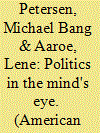| Srl | Item |
| 1 |
ID:
141640


|
|
|
|
|
| Summary/Abstract |
Party identification is central to the study of American political behavior, yet there remains disagreement over whether it is largely instrumental or expressive in nature. We draw on social identity theory to develop the expressive model and conduct four studies to compare it to an instrumental explanation of campaign involvement. We find strong support for the expressive model: a multi-item partisan identity scale better accounts for campaign activity than a strong stance on subjectively important policy issues, the strength of ideological self-placement, or a measure of ideological identity. A series of experiments underscore the power of partisan identity to generate action-oriented emotions that drive campaign activity. Strongly identified partisans feel angrier than weaker partisans when threatened with electoral loss and more positive when reassured of victory. In contrast, those who hold a strong and ideologically consistent position on issues are no more aroused emotionally than others by party threats or reassurances. In addition, threat and reassurance to the party's status arouse greater anger and enthusiasm among partisans than does a threatened loss or victory on central policy issues. Our findings underscore the power of an expressive partisan identity to drive campaign involvement and generate strong emotional reactions to ongoing campaign events.
|
|
|
|
|
|
|
|
|
|
|
|
|
|
|
|
| 2 |
ID:
121122


|
|
|
|
|
| Publication |
2013.
|
| Summary/Abstract |
How do modern individuals form a sense of the vast societies in which they live? Social cognition has evolved to make sense of small, intimate social groups, but in complex mass societies, comparable vivid social cues are scarcer. Extant research on political attitudes and behavior has emphasized media and interpersonal networks as key sources of cues. Extending a classical argument, we provide evidence for the importance of an alternative and internal source: imagination. With a focus on social welfare, we collected survey data from two very different democracies, the United States and Denmark, and conducted several studies using explicit, implicit, and behavioral measures. By analyzing the effects of individual differences in imagination, we demonstrate that political cognition relies on vivid, mental simulations that engage evolved social and emotional decision-making mechanisms. It is in the mind's eye that vividness and engagement are added to people's sense of mass politics.
|
|
|
|
|
|
|
|
|
|
|
|
|
|
|
|